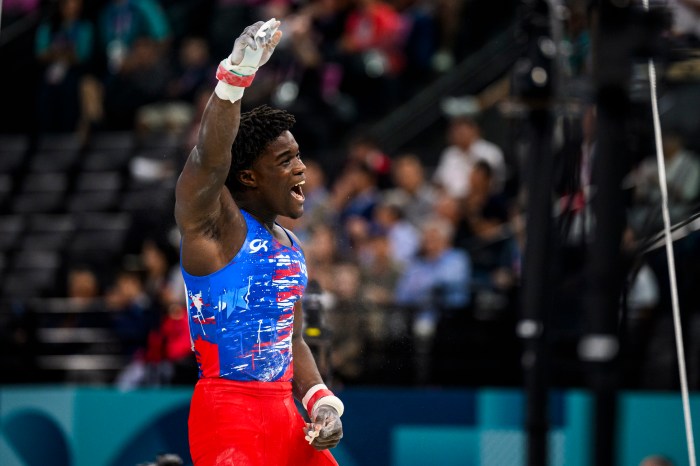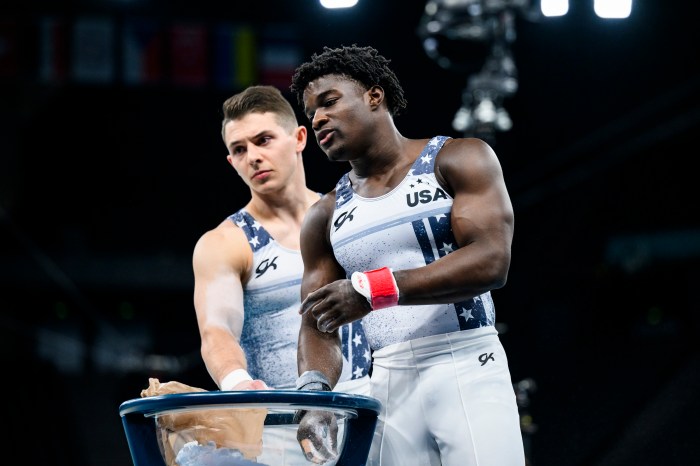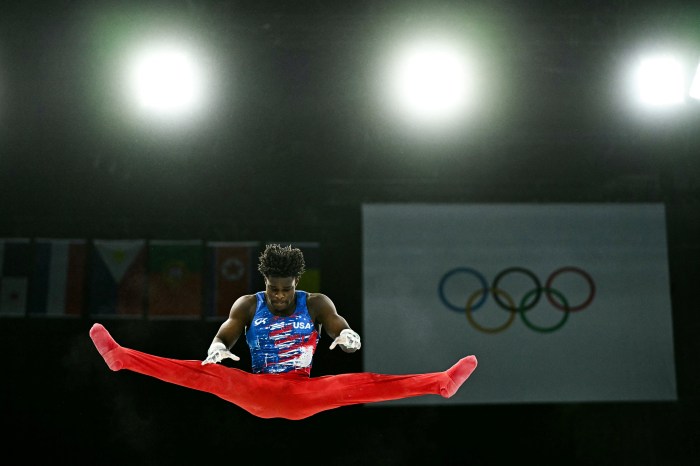
Andscape at the Olympics is an ongoing series exploring Black athletes and the culture around the Paris 2024 Games.
PARIS – “I’ve been looking at people upside down all my life.” — Frederick Richard
Shortly before his departure for Paris, Frederick Richard was on a video conference with some students to discuss, among other things, his excitement at the idea of participating in his first Olympic Games. He also talked about how he wanted to be presented before his first Olympic competition. Could it be Frederick Flips, as he is known to several thousand followers on social networks?
Would it be Fred Richard, or would he choose the more formal name Frederick Richard, perhaps with a French twist on “Richard”?
Everyone made a suggestion. Richard said he would consider them all.
The answer came Saturday morning, on the first day of Olympic competition. During the team presentations, the announcer introduced the young gymnast as “Frederick Richard.”
“I felt good,” Richard said in the mixed zone after Saturday’s competition. “That’s my real name, it’s the French name, Frederick Richard, the brand name is Frederick Flips, so I guess I should be called Frederick.”
Whatever name he used, Richard left an impressive calling card for the first day. A solid performance on the high bar and an electric routine on the floor left the crowd buzzing, eager for the week ahead.
Richard has been dreaming of this Olympic moment for years. After the first day of competition, he was asked if the anticipation he felt was as great as the moment itself.
“I think it’s better,” he said. “The energy is incredible, my body feels good, I’m healthy, I’m strong and this is the moment I’ve been waiting for, I want to enjoy it and I’m enjoying it.”

Tom Weller/VOIGT/GettyImages
For the 20-year-old, a junior at the University of Michigan, Saturday was just the first day, the first step in a multifaceted set of ambitious goals: winning an Olympic gold medal, making U.S. men’s gymnastics relevant and attracting more African-American men to a sport in which black men have been few and far between.
It’s a lot of extra weight to carry in rigorous Olympic competition, but Richard said it doesn’t feel like a burden.
“It motivates me, it’s more of an opportunity,” he said. “If someone needs to do it, I can do it. It’s powerful, like I have a calling. I have a purpose in my sport. It’s bigger than just winning medals.”
“I think it makes it easier. When I go to these Olympics, I feel like I’m supposed to do something powerful. I’m supposed to do something that makes history.”
The last medal won by the U.S. men’s gymnastics team was bronze at the 2008 Beijing Olympics. Richard became the youngest American gymnast to win an individual world medal in the men’s competition at the 2023 World Gymnastics Championships. With the bronze, Richard became the first American medalist in the men’s all-around competition since 2010.
Richard said his long-term plan is to get as many eyes on the sport as possible. “People don’t see gymnastics on the men’s side,” he said. “You see basketball every day, when you pick up your phone, when you walk down the street, when you turn on the TV. You don’t see gymnastics being talked about.”
“When you ask someone on the street to name a gymnast, they might name Simone (Biles) or a female gymnast. If you think about the sport and you’re wondering what sport you want to put your child in, at least if you see women’s gymnastics, you can at least think that’s a possibility. Right now, people never think about men’s gymnastics as a possibility.”
Many consider U.S. men’s gymnastics to be a last-minute thought.

Tom Weller/VOIGT/GettyImages
While the presence of black men in gymnastics has remained uneven, black women have emerged as a powerful force. In 1992, Dominique Dawes became the first black woman to win an individual Olympic medal. In 2012, Gabby Douglas became the first black gymnast to win the all-around title, and Biles continues to single-handedly redefine women’s gymnastics. Six members of the senior women’s national team are African American.
While black female gymnasts have reached critical mass, Richard is often a lone figure, the only elite black male gymnast in the sport.
This also fueled him.
“You feel uncomfortable, especially when you’re young,” he said. “When you’re young, you try harder to fit in. Once you get older, you think, ‘Whatever, I’ll be myself.’”
“It pushed me to be the best. I want to dominate. I don’t want to be the only one who doesn’t stand out. I want to be the best, the one that everyone looks up to. That’s what pushed me to reach the highest level to win these competitions. I’m the young black guy, but I’m the young black guy who’s really good at gymnastics.”
Richard was introduced to gymnastics at the age of 2 when his older sister began learning gymnastics at a place near their home in Stoughton, Massachusetts.
Richard followed them. He saw everyone doing somersaults and he started doing them too. There is a picture of Richard in his crib doing a handstand. Two years later, Richard’s parents signed him up for gym membership.
“I would go to the gym and see people doing somersaults. I was 2 years old,” he said. “So when I got home, I would do somersaults on the bed.”
No sport appealed to him – not football, not baseball, not American football, not basketball. Gymnastics was his specialty. “I loved it from the beginning, so I never thought about changing sports and trying new sports,” he said.

GABRIEL BOUYS/AFP via Getty Images
The most difficult moment of Richard’s career was when he suffered a stress fracture in his back at age 14. He was out of action for six months, tried to come back too soon, suffered another stress fracture and was sidelined for another six months.
This injury changed the trajectory of his life in gymnastics and led him to Paris.
“It’s a time when you discover who you want to be in the future, what you really love,” he said. “During that one-year period, I realized how much I loved this sport, how much it was a part of me.
“When I came back, I decided to give it my all every day, because I knew what it was like to not have everything I had. It was that change that put me on the path to becoming an Olympian.”
Richard didn’t attend the opening ceremony on Friday. With the competition set to start a day later, he chose to conserve his energy. It’s just one of the many sacrifices he’s made to get to this point in his career.
With the next Olympics scheduled for Los Angeles in 2028, Richard’s goal of advancing men’s gymnastics is timely. Following the Paris Games, he will embark on a 30-city Gold Over America tour, spreading the gospel of gymnastics.
“One of my goals is that one day someone walks down the street and you ask them to name a male gymnast and they actually name a male gymnast,” he said.
He would like the name to be his own. Richard has a clothing line, Frederick Flips, and a large following on social media.
All he needs now is an Olympic medal. Preferably gold.